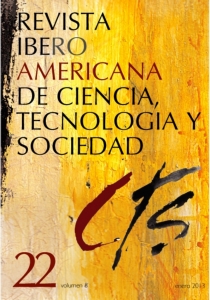Thomas Kuhn: The last of the classics or the first revolutionary? The Structure of Scientific Revolutions: 50 years later
(Presentation)
DOI:
https://doi.org/10.52712/issn.1850-0013-660Abstract
Acerca de Isaac Newton dijo John M. Keynes que “no fue el primero de la era de la razón, sino el último de los magos”, el postrer representante de la genealogía iniciada por sumerios y babilonios que contribuyó a construir la herencia intelectual que alimentaría (y contra la cual se rebelaría) la ciencia moderna. Sobre Thomas S. Kuhn (1922-1996) campea una discusión en cierto modo análoga, proyectada en las constantes revisitas a su obra más influyente -cuya primera edición conmemora este dossier- y atizada en ocasiones por él mismo a través de las sucesivas respuestas, precisiones y reelaboraciones de sus posturas iniciales.
Downloads
References
BARKER, P. (1998): “Kuhn and the Sociological Revolution”, Configurations, vol. 6, n° 1 (winter 1998), pp. 21-32.
BARNES, B. (1980): Estudios sobre sociología de la ciencia, Madrid, Alianza.
BARNES, B. y SHAPIN, S. (1979): Natural order, Beverly Hills, Sage.
BIRD, A. (2011): “Thomas Kuhn”, The Stanford Encyclopedia of Philosophy(Winter
Edition). Disponible en: http://plato.stanford.edu/entries/thomas-kuhn/.
BLOOR, D. (1976): Knowledge and Social Imagery, Chicago, The University of Chicago Press.
BUCCHI, M. (2004): Science in Society, Londres y Nueva York, Routledge.
COLE, S. (1992): Making Science. Between Nature and Society, Cambridge y Londres, Harvard University Press.
DOMÈNECH, M. y TIRADO, F. J. (1998): Sociología simétrica. Ensayos sobre ciencia, tecnología y sociedad,Barcelona, Gedisa.
FERREIRÓS, J. y ORDÓÑEZ, J. (2002): “Hacia una filosofía de la experimentación”, CRÍTICA, Revista Hispanoamericana de Filosofía, vol. 34, n° 102, pp 47-86.
FULLER, S. (2000): Thomas Kuhn: a Philosophical History for our times,Chicago, The University of Chicago Press.
FULLER, S. (2003): Kuhn vs. Popper. The Struggle for the Soul of Science,Cambridge, Icon Books.
GIERE, R. (2004): “Cognitive Studies in Science and Technology”, en E. Hackett et al (eds.): The Handbook of Science and Technology Studies,Cambridge y Londres, The MIT Press, pp. 259-278.
GOLDMAN, A. (2010): “Social Epistemology”, The Stanford Encyclopedia of Philosophy(Summer 2010 Edition). Disponible en: http://plato.stanford.edu/archives/ sum2010/entries/epistemology-social/.
HACKING, I. (1983): Representing and Intervening: Introductory Topics in the Philosophy of Natural Science, Cambridge, Cambridge University Press.
KITCHER, P. (1993): The Advancement of Science, Oxford University Press.
KUHN, T. (1970): “Reflections on my critics”, en I. Lakatos y A. Musgrave (eds.): Criticism and the Growth of Knowledge, Cambridge, Cambridge University Press.
KUHN, T. (1982): La tensión esencial, México, Fondo de Cultura Económica.
KUHN, T. (1987): Black-Body Theory and the Quantum Discontinuity. 1894-1912, Chicago, The University of Chicago Press.
KUHN, T. (1992): La Estructura de las Revoluciones Científicas, Buenos Aires, Fondo de Cultura Económica.
KUHN, T. (2002): El Camino desde la estructura.Ensayos filosóficos, 1970-1993, con una entrevista autobiográfica, edición a cargo de J. Conant y J. Haugeland, Barcelona, Paidós.
LAW, J. (1975): “Is Epistemology Redundant? A Sociological View”, Philosophy of the Social Sciences, n° 5, pp. 317-337.
NERSESSIAN, N. (2003): “Kuhn, conceptual change and cognitive science”, en T. Nickles (ed.): Thomas Kuhn, Cambridge, Cambridge University Press, pp. 178-211.
OBERHEIM, E. y HOYNINGEN-HUENE, P. (2012): “The Incommensurability of Scientific Theories”, The Stanford Encyclopedia of Philosophy(Summer 2012 Edition). Disponible en: http://plato.stanford.edu/archives/sum2012/entries/incommensurability/.
PÉREZ RANSANZ, A. R. (1999): Kuhn y el cambio científico, México, Fondo de Cultura Económica.
PÉREZ RANSANZ, A. R. (2006): “Racionalidad y desarrollo científico”, en L. Olivé (ed.): Racionalidad Epistémica.Enciclopedia Iberoamericana de Filosofía,Madrid, Ed. Trotta/CSIC.
PICKERING, A. (1992): Science as practice and culture, Chicago, Chicago University Press.
PICKERING, A. (1995): The Mangle of Practice. Time, Agency and Science. Chicago y Londres, Chicago University Press.
REISCH, G. (1991): “Did Kuhn kill Logical Empiricism?”, Philosophy of Science, vol.
, n° 2 (junio de 1991), pp. 264-277
ROUSE, J. (1987): Knowledge and Power. Toward a political philosophy of science, Ithaca y Londres, Cornell University Press.
ROUSE, J. (1998): “Kuhn and Scientific Practices”, Configurations, vol. 6, n° 1, pp. 33- 50.
SCHATZKI, T.; KNORR CETINA, K. y VON SAVIGNY, E. (2001): The practice turn in contemporary theory, Londres, Routledge.
SHAPIN, S. y SCHAFFER, S. (2005): El Leviathan y la bomba de vacío. Hobbes, Boyle y la vida experimental, Buenos Aires, Universidad Nacional de Quilmes.
SISMONDO, S. (2008): “Science and technology studies and an engaged program”, en E. Hackett et al (eds.): ob.cit., pp. 14-31.
SOLÍS, C. (1994): Razones e intereses. La historia de la ciencia después de Kuhn, Barcelona, Paidós.
STOVE, D. (1982): Popper y después. Cuatro irracionalistas contemporáneos, Madrid, Tecnos.
THEOCHARIS, T. y PSIMOPOULOS, M. (1987): “Where Science has Gone Wrong”, Nature, vol. 329, n° 6140, October 1987, pp. 595-598.
TURNER, S. (2008): “The Social Study of Science before Kuhn”, en E. Hackett et al (eds.): ob.cit., pp. 33-62
ZAMMITO, J. (2004): Anice derangement of epistemes. Post-positivism in the study of science from Quine to Latour, Chicago, The University of Chicago Press.
Downloads
Published
How to Cite
Issue
Section
License
Copyright (c) 2024 CC Attribution 4.0

This work is licensed under a Creative Commons Attribution 4.0 International License.
All CTS's issues and academic articles are under a CC-BY license.
Since 2007, CTS has provided open and free access to all its contents, including the complete archive of its quarterly edition and the different products presented in its electronic platform. This decision is based on the belief that offering free access to published materials helps to build a greater and better exchange of knowledge.
In turn, for the quarterly edition, CTS allows institutional and thematic repositories, as well as personal web pages, to self-archive articles in their post-print or editorial version, immediately after the publication of the final version of each issue and under the condition that a link to the original source will be incorporated into the self-archive.











